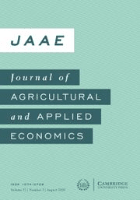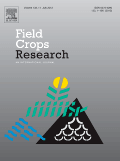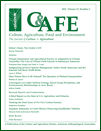
Journal of Agricultural Sciences
Scope & Guideline
Innovating insights in agricultural and biological sciences.
Introduction
Aims and Scopes
- Agricultural Production Systems:
Research on various agricultural practices, crop management, and livestock production systems that optimize yield and sustainability. - Environmental Impact and Sustainability:
Studies assessing the environmental implications of agricultural practices, including resource management, conservation techniques, and climate-smart agriculture. - Postharvest Technology and Food Security:
Exploration of postharvest processes, food preservation, and technologies that enhance food security and reduce waste in agricultural supply chains. - Agricultural Economics and Policy:
Analysis of economic factors affecting agriculture, including market trends, policy implications, and the socio-economic dynamics of agribusiness. - Innovative Agricultural Practices:
Investigation of new technologies, bioengineering, and agronomic practices that improve agricultural productivity and resource efficiency. - Qualitative Research in Agriculture:
Integration of qualitative methodologies to understand farmers' perspectives, cultural practices, and community engagement in agricultural development.
Trending and Emerging
- Climate-Smart Agriculture:
An increasing number of studies are addressing climate resilience, highlighting practices that adapt to and mitigate climate change impacts in agriculture. - Sustainable Resource Management:
Research focusing on sustainable management of water, soil, and biodiversity is on the rise, indicating a shift towards environmentally friendly agricultural practices. - Functional Foods and Nutraceuticals:
There is a growing interest in the development and evaluation of functional foods, highlighting the nutritional benefits and health impacts of various agricultural products. - Digital Agriculture and Technology Integration:
Emerging topics include the application of digital technologies in agriculture, such as precision farming, data analytics, and the Internet of Things (IoT) for improved decision-making. - Agritourism and Rural Development:
Research exploring the intersection of agriculture and tourism is trending, emphasizing the role of agritourism in enhancing rural economies and community engagement.
Declining or Waning
- Traditional Crop Breeding:
Research focusing on conventional breeding techniques has decreased as modern biotechnological approaches and genetic engineering gain prominence. - Chemical Fertilizer Reliance:
There is a noticeable decline in studies promoting the use of chemical fertilizers, reflecting a growing shift towards organic and sustainable agricultural practices. - Static Pest Management Strategies:
Research on traditional pest management strategies is declining in favor of integrated pest management (IPM) approaches that emphasize ecological balance. - Livestock Production without Sustainable Practices:
Focus on conventional livestock production methods has waned, as there is an increasing emphasis on animal welfare and sustainable farming practices. - Single Crop Focus:
There is a reduction in research centered on single crop systems, with a growing interest in intercropping and polyculture systems that enhance biodiversity and resilience.
Similar Journals

Journal of Agriculture and Food Research
Exploring the Future of Food and FarmingJournal of Agriculture and Food Research, published by ELSEVIER, is a premier Open Access journal that has made significant strides in the fields of agricultural and biological sciences since its launch in 2019. With an ISSN of 2666-1543, the journal is headquartered at Radarweg 29, 1043 NX Amsterdam, Netherlands. It holds a remarkable position in the 2023 Category Quartiles, achieving Q1 rankings in Agricultural and Biological Sciences (miscellaneous), Agronomy and Crop Science, and Food Science. The journal's impactful research is reflected in its impressive Scopus ranks, including a ranking of #25 in Agricultural and Biological Sciences, showcasing the journal's commitment to high-quality, innovative research relevant to contemporary agricultural challenges. Researchers, professionals, and students can benefit from its diverse array of published works, fostering a greater understanding of food security, sustainable agriculture, and innovative food technologies. By embracing an open access model, the journal ensures that critical research is readily available to a global audience, aiming to enhance knowledge dissemination in this vital field.

NJAS-Impact in Agricultural and Life Sciences
Advancing knowledge at the intersection of agriculture and life sciences.NJAS-Impact in Agricultural and Life Sciences is a pivotal open-access journal, published by Taylor & Francis Ltd, focusing on the interdisciplinary nexus between agricultural practices and life sciences. Anchored in the United Kingdom, this journal aims to provide a comprehensive platform for the dissemination of innovative research that addresses critical challenges in environmental sustainability, agricultural productivity, and biological advancements. With its inaugural issue dated from 2023 to 2024, NJAS prominently features the latest empirical studies, reviews, and theoretical contributions that enrich existing knowledge and provoke thought among researchers and practitioners alike. Although currently ranking within the lower percentiles across various Scopus categories, the journal aspires to establish itself as a significant contributor to the dialogue on agricultural and environmental sciences. As scholars in these fields seek to bridge the gaps in understanding, NJAS invites submission from diverse perspectives, underscoring the importance of collaborative knowledge-building in addressing the complexities of our changing global landscape.

Scientific Papers-Series Management Economic Engineering in Agriculture and Rural Development
Catalyzing Change in Rural Development through Economic EngineeringScientific Papers-Series Management Economic Engineering in Agriculture and Rural Development is a premier open access journal dedicated to advancing the field of agricultural and rural development management. Published by the University of Agronomic Sciences and Veterinary Medicine Bucharest, this journal has been a valuable resource for researchers, practitioners, and students since its inception in 2009. With a focus on the integration of economic engineering principles into agricultural practices, the journal aims to provide innovative solutions and insights that address contemporary challenges in rural development. While the journal's H-index and specific Scopus rankings are not listed, its open access format ensures that cutting-edge research is readily available to a global audience, facilitating engagement and collaboration across disciplines. Located in the heart of Romania, the journal serves as a critical platform for disseminating impactful research and fostering dialogue in the ever-evolving landscape of agriculture and rural development.

Journal of Agricultural and Applied Economics
Exploring innovative solutions for global food security.The Journal of Agricultural and Applied Economics, published by Cambridge University Press, stands as a leading platform for disseminating innovative research in the fields of agriculture, economics, and applied sciences. With an impressive impact factor and a prestigious Q1 ranking in Agricultural and Biological Sciences and Q2 in Economics, this journal is recognized for its rigorous peer-reviewed content that addresses contemporary challenges in agricultural and economic policies. Since its transition to Open Access in 2015, it has widened its reach, allowing scholars, practitioners, and students unrestricted access to vital research findings. The journal's scope encompasses a wide array of topics, fostering interdisciplinary dialogue and offering insights essential for informed decision-making in the agricultural sector. Addressing critical issues from food security to sustainable practices, the Journal of Agricultural and Applied Economics is instrumental for anyone seeking to contribute to the advancement of knowledge in these pivotal areas.

Chilean Journal of Agricultural & Animal Sciences
Exploring the nexus of agriculture and animal sciences.Chilean Journal of Agricultural & Animal Sciences, published by UNIV CONCEPCION, CAMPUS CHILLAN, serves as a pivotal platform for disseminating innovative research in the agricultural and biological sciences. With an ISSN of 0719-3882 and an E-ISSN of 0719-3890, this journal has established its significance in the academic community, particularly within the realm of agricultural studies in Chile and beyond. As it continues to evolve from 2014 through 2024, the journal is classified in the Q4 quartile for Agricultural and Biological Sciences and ranks 187th out of 221 journals in this category according to Scopus, placing it in the 15th percentile. While currently not an open-access journal, it aims to provide readers with insightful studies and developments that contribute to the understanding of agricultural practices and animal sciences. Researchers, professionals, and students will find invaluable resources here, fostering knowledge transfer and collaboration within this critical field.

Journal of Tekirdag Agriculture Faculty-Tekirdag Ziraat Fakultesi Dergisi
Fostering global collaboration in agricultural research.The Journal of Tekirdag Agriculture Faculty-Tekirdag Ziraat Fakultesi Dergisi, published by UNIV NAMIK KEMAL, represents a significant platform dedicated to the dissemination of research in the fields of agricultural and biological sciences. With an ISSN of 1302-7050 and E-ISSN 2146-5894, this journal aims to advance knowledge and innovation within its scope, which encompasses a diverse array of agricultural topics and environmental pollution. Notably, it has achieved a Q3 category ranking in Agricultural and Biological Sciences and a Q4 category ranking in Pollution for 2023, reflecting its growing influence in the academic community. Operating from Turkey, the journal publishes articles that seek to address contemporary challenges in agriculture and environmental science, thus fostering collaborations among researchers, professionals, and students worldwide. Researchers can benefit from the journal’s focus on applied sciences, providing insights and solutions pertinent to real-world issues. Engage with cutting-edge studies and contribute to this evolving field by exploring the transformative research featured within.

SCIENTIA AGRICOLA
Fostering sustainable solutions through open access scholarship.SCIENTIA AGRICOLA is a prestigious, peer-reviewed journal published by UNIV SAO PAULO, ESALQ, dedicated to advancing the field of agricultural sciences. With the ISSN 1678-992X and an e-ISSN maintaining the same number, this Open Access journal has been a valuable resource since 1992, fostering wide dissemination of knowledge and research findings in agriculture. Hailing from Piracicaba, Brazil, associated with one of the leading agricultural universities, SCIENTIA AGRICOLA serves as an essential platform for researchers, practitioners, and students aiming to explore innovative agricultural practices, crop production, and sustainable techniques. Although specific metrics such as H-Index and Scopus Ranks were not provided, the journal's longstanding commitment to open access and impactful research underscores its importance in contributing to the global dialogue on agricultural efficiency and sustainability.

FIELD CROPS RESEARCH
Shaping the Future of Field Crops Through KnowledgeFIELD CROPS RESEARCH is a premier academic journal published by Elsevier, dedicated to advancing knowledge in the fields of Agronomy and Crop Science as well as Soil Science. Now in its 46th year of publication, this esteemed journal has established itself as a leading resource, holding a prestigious Q1 ranking in both the Agronomy and Soil Science categories, with a remarkable blend of rigorous peer-reviewed research and innovative findings. With a Scopus ranking of #27/406 in Agronomy and #20/159 in Soil Science, and a notable 93rd and 87th percentile respectively, FIELD CROPS RESEARCH plays a vital role in informing practices that drive sustainable agriculture and optimize crop production. Although not an open access journal, it remains highly accessible to the global research community and offers critical insights that influence policy and agricultural practices worldwide. Researchers, professionals, and students are encouraged to delve into this journal, as it continues to shape the future of field crop research through impactful studies and comprehensive reviews.

Revista de Agricultura Neotropical
Unlocking the Potential of Tropical Crop ManagementRevista de Agricultura Neotropical, published by UNIV ESTADUAL MATO GROSSO SUL, serves as a pivotal platform for disseminating research in the fields of agronomy and crop science. Since its inception as an open-access journal in 2014, it has been dedicated to promoting innovative research and practical applications within the agricultural sector, specifically tailored to the challenges and dynamics of the tropical agriculture landscape in Brazil and beyond. Although currently positioned in the Q4 quartile of Scopus rankings, and with a modest agricultural science percentile, the journal actively encourages contributions that highlight sustainable agricultural practices, tropical crop management, and emerging technologies in farming. With its commitment to open access, the Revista de Agricultura Neotropical broadens the reach of critical knowledge, making it accessible to researchers, professionals, and students alike, thus fostering a collaborative environment for advancing agri-scientific initiatives.

Culture Agriculture Food and Environment
Exploring the Intersections of Culture, Agriculture, and SustainabilityCulture Agriculture Food and Environment, published by WILEY, is an esteemed journal that serves as a pivotal platform for interdisciplinary research at the intersection of cultural studies, anthropology, and agricultural sciences. With its ISSN 2153-9553 and E-ISSN 2153-9561, this journal aims to foster scholarly dialogue on the complex relationships between food, culture, and environmental sustainability. As of 2023, it proudly holds a Q2 ranking in Agricultural and Biological Sciences and Anthropology, as well as a Q1 ranking in Cultural Studies, indicating its significant impact within these disciplines. Researchers and professionals will appreciate its rigorous peer-review process and diverse coverage, which extends from 2011 to 2024, reflecting ongoing debates and innovations in the field. Although open access options are not provided, the journal's commitment to advancing knowledge in understanding food systems and cultural practices makes it a vital resource for academics and practitioners alike, promoting a deeper understanding of the cultural dimensions of agriculture and the environment.